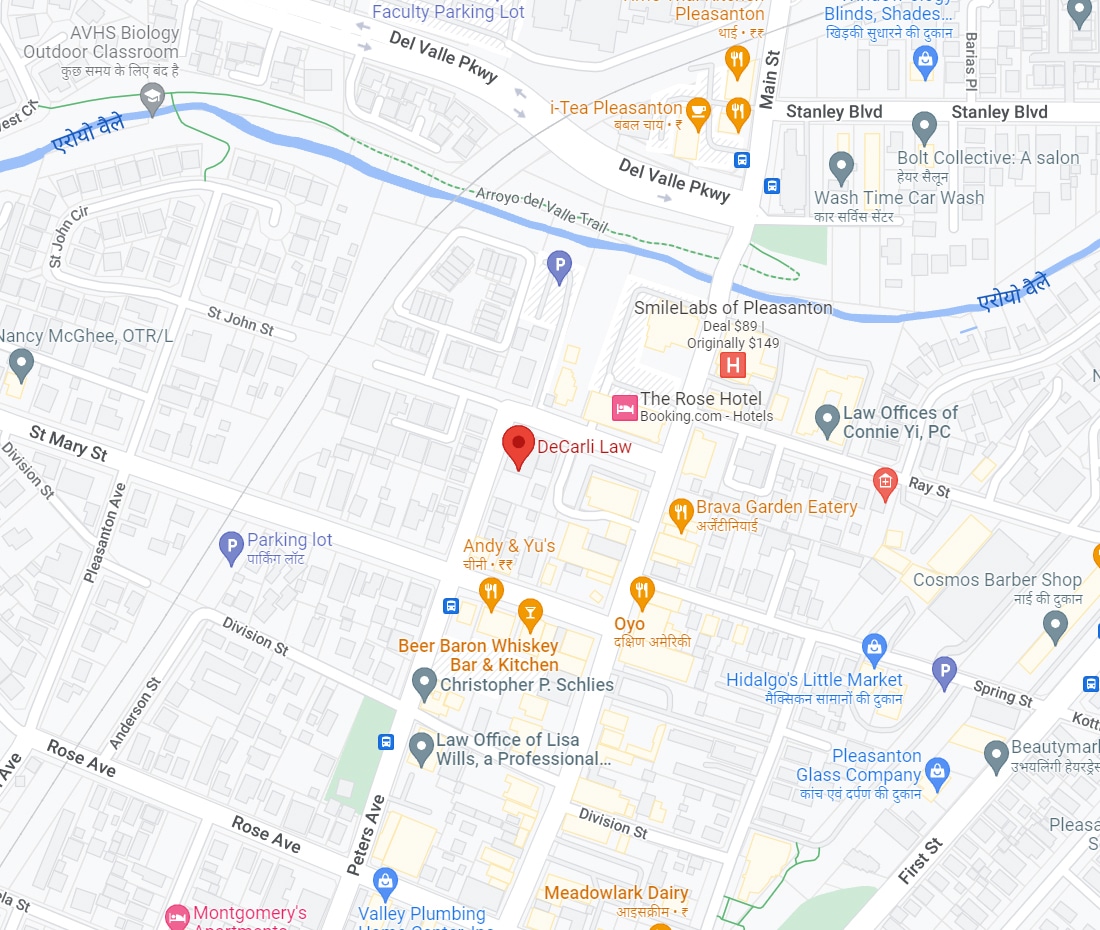Will Lawyers Serving Families Throughout Northern California
Attorney Debra DeCarli has been helping families with their estate planning needs for years and has the experience and knowledge to make sure your will is prepared properly, avoiding going to the courts under probate law. She can help with estate plans for individuals with a variety of needs, including:
- Families with children from previous marriages or relationships
- Families with minor children
- Homeowners or individuals with other real property ownership
The law offices of DeCarli Law are conveniently located in both Pleasanton, CA, and lovely Mendocino, CA. However, we recognize that some individuals prefer not to meet in person at this time, and we gladly offer virtual and phone appointments as well. Don’t delay the important step of preparing your will, call our estate planning law group today at (707) 937-2701 to speak with a Northern California wills lawyer.
What Is a Will and Living Will in California?
A will, or “Last Will and Testament,” is an essential element of basic estate planning. Understanding what a will is—and knowing what will happen if you don’t have one—is an important cornerstone of the estate planning process.
A Last Will and Testament is a legal document that provides your instructions for the distribution of your property and assets after your death. Because a will is a formal document with significant legal implications, there are specific requirements set by state law for executing (signing) a will for it to be valid.
In California, establishing a will is only part of the equation for basic estate planning. If you own real property, a trust will also be part of your estate plan.
A living will is not the same as a will. A living will—also called an advance directive or healthcare directive— is a different document. In it, you state your wishes for end-of-life medical care, to guide your family and medical professionals in the event you become unable to express your wishes. A living will is often part of a comprehensive estate plan in California.
Attorney Debra DeCarli has been serving clients in California for many years and knows how to handle the legal matters associated with estate planning. You can trust our Northern California wills lawyers with all of your estate planning needs, so reach out to us with all your questions today for legal assistance.
What If You Don’t Have a Will in California?
If you die without having a will—referred to as dying intestate—the law of the state where you reside at your death will determine who receives your property.
Under California law, if you die intestate and are married or are in a registered domestic partnership, your spouse or domestic partner will receive part of your separate property, in addition to receiving all of your community property assets. The other part of your separate property will be distributed to your children or grandchildren, parents, sisters, brothers, or other close relatives. If your spouse or domestic partner dies before you, his or her relatives may also be entitled to part or all of your estate.
If you are not married or in a registered domestic partnership when you die under probate, your children or grandchildren will be entitled to your property. If you have no children or grandchildren, your assets will go to your parents, brothers, sisters, or other relatives. Your friends, non-registered domestic partners, and charitable organizations receive nothing if you die intestate.
If you die without a will, and you and your deceased spouse or registered domestic partner have no living relatives, your estate assets go to the State of California. An estate planning lawyer from our firm can help you ensure all your estate planning needs are met.
How Does A Will Take Care of Your Family and Loved Ones?
By making a will, you take care of your family and loved ones by accomplishing several tasks:
Naming Your Beneficiaries
The primary purpose of a will is to name beneficiaries: the individuals, trusts, or organizations that will receive your property. Beneficiaries can include a spouse, other parent, or domestic partner, trusts, other family members, friends, and charitable organizations.
Gifts to beneficiaries can be made in your wills in the form of real property, personal property, or cash. Making gifts of personal property can be important if you have family heirlooms or other items that you would like someone specific to have. A will also names a residual beneficiary, who will receive the assets of the estate remaining after all specific gifts have been made.
Identifying a Guardian for Your Minor Children
Your will can name the person whom you would like to be responsible for a child under 18 years of age if both parents are deceased. You can name one guardian for a child’s personal care and management of assets given to the child, or you can name two different guardians for the separate responsibilities.
Deciding Who Will Administer Your California Estate
In the will, you name an executor, who will be the person or institution overseeing your estate. The executor pays outstanding bills, expenses, and taxes; makes sure that your real and personal property is given to those you designate as beneficiaries; and eventually settles your estate.
The executor plays a very significant role and should be selected carefully. You can appoint someone you know and trust, such as a spouse, domestic partner, or another family member. You can also choose an institution like a bank. When individuals are named as the executor in a will, it is customary to identify an alternate executor to serve in that capacity in the event the primary executor is unable to serve.
Does a Will Cover All Your Property in California?
Your will includes only assets that are titled in your name at your death. It does not include items for which you have designated a specific beneficiary (or trustee) and some property that you hold jointly with another person. Excluded items include:
- Your spouse’s or registered domestic partner’s half of community property
- Property held jointly with another person as joint tenants with a right of survivorship, like real estate and financial accounts
- Life insurance proceeds, retirements plans like a 401(k) or IRA, and any other property that has a named beneficiary
- Accounts with “transfer on death” (TOD) or “pay on death” (POD) provisions, like brokerage accounts, other bank accounts, and U.S. savings bonds
- Property in living trusts
Can a Will Be Changed or Revoked?
Not only can you change or revoke a will after you have made it, but you should revisit it periodically to make sure that it’s up to date. Events like marriage or divorce, registering or terminating a domestic partnership, having or adopting a child, death of a beneficiary, and other major life events can significantly impact the effectiveness of your will.
However, you cannot change a will simply by crossing out sections or writing in additions or changes. The same formalities and execution requirements apply to changes in a will that apply to making it in the first place. You can either make a new will that revokes the prior one or execute an amendment to your original will—called a codicil—to change some of the provisions of the original will. Having a California estate planning law firm help create and adjust your will can ensure everything is valid under California estate law.
What Are Some Reasons to Have a Will?
If you have minor children, it is critical to ensure that a person you know and trust will manage the property on their behalf and take care of them in the event both parents die. Usually, a trust is the best way to handle this. This gives them the money they will need, regardless of what happens.
In addition, if you have any separate property when you die, a will ensures that those assets are distributed according to your specific wishes. Even if most of your property is held jointly with another person, there is always the chance that you will acquire separate property through an inheritance or otherwise. There is also the chance that your joint owner will predecease you, leaving you as the sole owner of the property.
With assets like retirement accounts and life insurance policies, if your named beneficiary dies before you do, those assets could end up in your estate. Making a will, usually along with a revocable living trust, ensures that your property is distributed exactly in the manner you prefer, rather than being distributed by a court according to state law.
Can Our California Estate Planning Attorneys Help You?
Having a will can save your family from dealing with California probate law and is an important part of estate planning. Probate court matters can quickly become complicated and expensive. The law group under Attorney Debra DeCarli has the wills lawyer experience to protect our clients from estate litigation. If you are thinking about making a will—or if you have a will that needs to be updated—schedule a initial consultation with lawyers specializing in wills today.
Attorney DeCarli’s offices are located in Mendocino and Pleasanton, and she assists clients throughout California. Use the DeCarli Law online contact form or call (707) 937-2701 to set up a no-cost telephone, in-person, or virtual consultation with a California wills lawyer.




